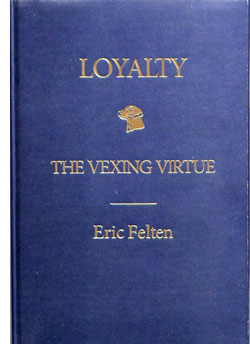 |
 |
 Eric Felten
Eric Felten
Loyalty: The Vexing Virtue
Reviewed by: Rick Kleffel © 2011
Simon & Schuster
US Hardcover First Edition
ISBN 978-1-439-17686-3
Publication Date: 04-26-2011
310 Pages ; $25
Date Reviewed: 05-01-2011
Index:
Non-Fiction
One might think that one can never have too much "good" in one's life. By definition, virtue is a virtue — but only in a solitude that our lives do not allow. It would be nice were we to have the luxury of adhering to the virtues of family alone; or of love, or the virtue of good citizenship. Reality, alas, does not cooperate. Our lives are messy affairs and the jostling of virtues — and loyalties — is much more complicated than the Platonic platitudes of bleating philosophers.
Eric Felten takes a very peculiar approach to his philosophic work 'Loyalty: The Vexing Virtue.' This is not a general treatise. This is not an examination of life in full, at least not apparently. Felten focuses his work on a single virtue, loyalty, but in so doing, he finds a wealth and variety of human experience and perhaps humanity itself.
'Loyalty' is a little book that benefits from the virtues of brevity. Felten gets straight to the point and examines loyalty from a variety of perspectives, but never gets lost in abstractions. While a book that devotes itself to being solely about a virtuous human character trait pretty much must be a work of philosophy, Felten demonstrates that this does not mean it must consist of mathematicized ethical hair-splitting. Felten makes a smart decision from the get-go and manages to write a book about loyalty that keeps its focus on real life and real-life examples of its subject.
The book unfolds in nine short chapters that examine loyalty from a variety of perspectives. He begins with "The Power of Loyalty," an examination of how loyalty helps us in the most basic sense. Felten starts by looking at the loyalty in the military, citing historical examples and keeping the reader both engaged and grounded. In this manner, the abstract notions of loyalty — the philosophical component — emerge from the reader's mind, not the writer's. It's a smart move. Felten even includes some of his own personal history working with the (in)famous "Prisoner's Dilemma. The often-paradoxical power of loyalty is brought home with a personal experience.
But, as he progresses to "Loyalties at Loggerheads," and "The Ever-Ready Accomplices," Felten begins to make it clear that loyalty can be perceived as more than a simple virtue in itself. Loyalty, which can be used to describe our choices to adhere to other virtues; love, honor, family, or country, for example — becomes a sort of "meta-virtue." In this realm, the simplicity of being loyal gives way to a much more nuanced and complicated juggling of loyalties. In "The Ever-Ready Accomplices," Felten examines how the virtue of loyalty can be turned to vice when, as we so often see, it is used to put country before family.
In successive chapters, each engagingly written and to-the-point, Felten looks at the varieties of loyalty and gives examples that bring home his point in an entertaining manner. But all the while, Felten is doing something rather unique and very interesting for readers. 'Loyalty' is a smashing success at turning the reading experience into a very pleasant and informative thinking experience. Felten helps readers think about loyalty in a philosophical manner by avoiding all the cliches of philosophical writing.
Instead, we're immersed in all the effects of our innate philosophical natures. As readers, our minds are filled with examples of every sort of loyalty one might imagine. Felten directs our thoughts and helps us put together a bigger, more complicated picture of loyalty than might have been imagined possible before reading the book. And by focusing on one virtue that touches all aspects of life, and indeed all virtues, he creates a clear vision of what we are — and what we might become, if we are indeed loyal.
|
 |
|
|
 |
| |
Review Archive
All Reviews alphabetized by author.
General Fiction
Non-Genre, general fiction and literature.
Horror
Supernatural fiction, supernatural horror and non-supernatural horror.
Science Fiction
Science fiction, science fantasy, speculative fiction, alternate history.
Fantasy
Fantasy, surrealism and magic realism.
Mystery
Crime, thrillers, mystery, suspense.
Non-Fiction
Non-Fiction, True Crime, Forteana, Reference.
Poetry
|
|
 |
|




